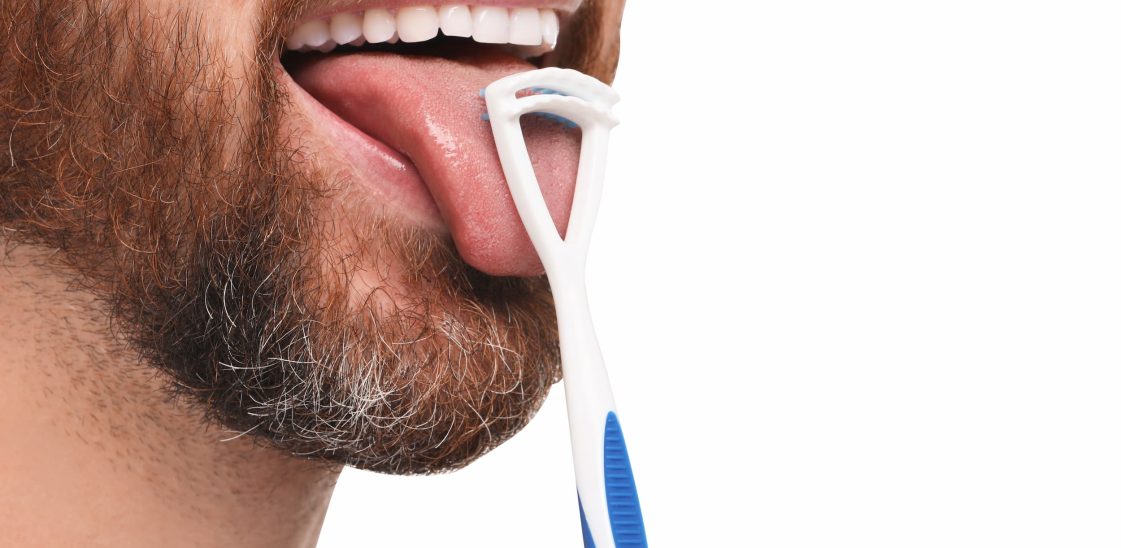
How to clean tongue scrapers
Scraping your tongue regularly is an excellent way to remove bacteria and food particles from your mouth, helping to keep your teeth clean and healthy.[1] Using a purpose-built product modelled on dentists’ equipment such as the Orabrush tongue cleaner is one of the best ways to keep your tongue clean, rather than trying to do it with household items like spoons.
However, just like toothbrushes, floss picks and interdental brushes, tongue cleaners need to be replaced eventually in order to keep achieving good dental hygiene. In this blog, we look at how you can clean your tongue scraper to keep it hygienic and in good condition, then explore how long you should wait to get a brand new tongue scraper.
How to clean a tongue scraper
The ways you can clean your tongue scraper can vary depending on what it’s made out of. If it’s a plastic design, then treat it the same as your toothbrush by remembering to rinse off any food particles, scraped-off bacteria or other residue with clean water. Let it air dry until the next use.
If you have a metal tongue scraper, however, then you may need to take more action. Metal tongue scrapers can be disinfected using boiling water, meaning they can last longer without you having to replace them. To do this, simply boil some water and place your tongue scraper into it, being careful not to scald yourself. Leave it for a few minutes – or until the water cools, if you prefer – and then dry it off.
This works by killing off any bacteria or other microorganisms that had built up on the tongue scraper over time. Other household disinfection methods such as salt, lemon or vinegar may also kill off unwanted bacteria, but they may also have unpleasant effects if ingested. It’s recommended to thoroughly rinse your tongue cleaner after disinfection to remove any leftover residues.
Using boiling water to disinfect your tongue scraper may work once or twice on a plastic scraper, but it’s not recommended to make it a regular habit. This is because the hot water can cause the plastic to melt and lose its shape, impacting the effectiveness of the tool. Instead, reserve this for disinfecting the scraper after a period of illness if you don’t have a spare tongue scraper to hand.
Before trying any method to clean your tongue scraper, it’s important to check the manufacturer’s usage instructions thoroughly to ensure what you’re doing is safe. They may have alternative recommendations for disinfecting your tongue scraper, and you should always follow the instructions specific to your tongue cleaner of choice. This is the best way to make sure your tongue scraper is safe to use.
How often to replace a tongue scraper
Again, the frequency with which you need to replace your tongue scraper depends on what material it’s made from. The advantage of being able to regularly disinfect a metal tongue scraper is that you can keep it for years, so long as you keep up with disinfection.
Plastic tongue scrapers, on the other hand, should ideally be replaced roughly every three to four months. While this might seem like a disadvantage when compared to the longevity of metal tongue scrapers, that’s not necessarily the case. Many people find that disinfecting their tongue cleaner is one more thing on an already-full plate of chores and things to remember – so having a plastic tongue scraper that just needs to be replaced with the next one from the drawer can be easier to handle.
On top of that, parents of young children may prefer plastic tongue scrapers so that they don’t have to expose little ones to boiling water or other disinfectants unnecessarily. Plastic tongue scrapers are also harder to hurt yourself with, so there’s a smaller risk of injury if a child gets their hands on it.
Furthermore, plastic tongue scrapers are far less expensive to buy, representing a smaller investment if you’re not sure whether tongue scraping is for you. And if you’re prone to losing dental care items or you travel a lot, the low cost of plastic tongue scrapers makes them ideal for buying multiple to have on hand when you need them.
Resources:
[1] https://doi.org/10.1111/j.0303-6979.2004.00507.x Quirynen, M., Avontroodt, P., Soers, C., Zhao, H., Pauwels, M. and Van Steenberghe, D. (2004), Impact of tongue cleansers on microbial load and taste. Journal of Clinical Periodontology, 31: 506-510.




